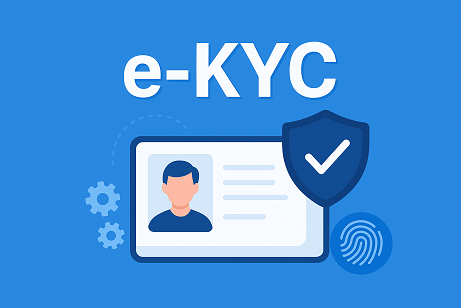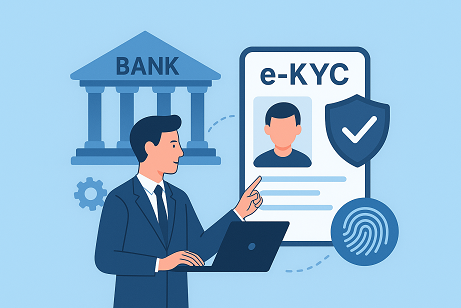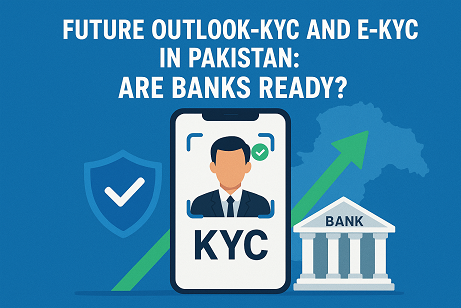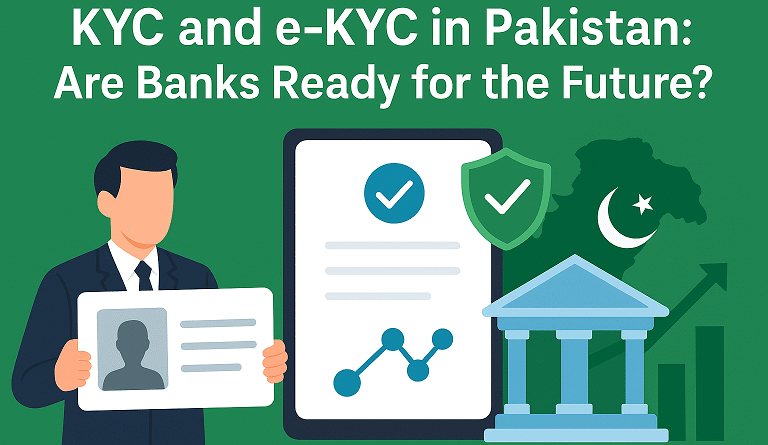KYC and e-KYC in Pakistan: Are Banks Ready for the Future?
Muhammad Mobasher Ali
Introduction
Know Your Customer (KYC) has long been the cornerstone of banking regulation in Pakistan—essential for preventing money laundering, terrorist financing, and fraud. Yet, as the financial sector becomes more digital and customer expectations evolve, the imperative has shifted toward electronic KYC (e-KYC). This article explores how Pakistani banks are embracing digital transformation (KYC and e-KYC in Pakistan), assesses the challenges they face, and evaluates whether they are poised for a future where e-KYC is the norm.
1. Traditional KYC in Pakistan: Challenges and Constraints
- Documentation and Accessibility
Many Pakistanis, especially in rural areas, still lack reliable identification like CNICs or passports—essential for effective KYC. Frauds and forgery further compound the issue. Nadra has already taken charge and given mobile offices through villages for creation/registeration of CNIC. However, passport field is still lacking behind, - Regulatory Complexity
The involvement of multiple regulators—SBP, SECP, FIA—creates inconsistent application of KYC norms across institutions. KYC is getting more complex day by day as per current market practice. - Digital Divide and Inclusion
A significant share of the population lacks internet access or digital literacy, obstructing online KYC processes and deepening financial exclusion. Even banks’ lack of trainings getting it more worse. - Informal Economy and Hawala Channels
A large informal economy and widespread use of alternative remittance channels make financial tracking difficult, reducing KYC reach, considering the lackage e-KYC is far more than of the KYC. - Data Security Risks
Digitizing KYC raises concerns over data breaches, storage safety, and privacy—especially without robust regulatory safeguards. LinkedIn.
2. The Leap to Shared e-KYC: Blockchain-Powered Transformation

- Platform Development
On March 2, 2023, Pakistan Banks Association (PBA) and Avanza Group signed an agreement to build the country’s first blockchain-based national e-KYC platform, named Consonance. Pakistan BanksCointelegraph. - How It Works
Built on distributed ledger technology, the platform allows banks to securely share KYC and Customer Due Diligence (CDD) data—with customer consent—without requiring a central data repository. Pakistan BanksProfit by Pakistan TodayProPakistani. - Anticipated Benefits
- Faster and more efficient customer onboarding;
- Standardized KYC across institutions;
- Lower operational costs;
- Enhanced financial inclusion by removing friction. Profit by Pakistan TodayProPakistaniPak Banker.
- Official Encouragement
SBP has urged banks to join the platform and allocate the necessary financial and human resources for its rollout. State Bank of PakistanProPakistani. - Public-Private Collaboration
The platform was showcased at the Pakistan Bank Summit 2025, spotlighting SBP, PBA, and Avanza’s roles in advancing digital banking. Pak Banker.
3. Adoption & Readiness: Are Banks Prepared?

- Strategic Planning
A virtual awareness session in April 2022 saw PBA urging member banks to form internal task forces to liaise with vendors and accelerate implementation. Pakistan Banks. - Regulatory Backbone
SBP’s circular in December 2023 formally endorsed the shared e-KYC platform, signaling regulatory support and direction. State Bank of Pakistan. - Existing Digital Momentum
Pakistan’s e-banking has surged: over 40 million users engage via mobile and internet banking, fueled further by instant payment systems like Raast and fintech EMIs. Wikipedia. - CEF and Fintech Integration
Platforms like Zindigi and Roshan Digital Account by JS Bank showcase growing digital banking adoption, though direct links to e-KYC rollout are still emerging. Wikipedia.
4. What Stands in the Way?
- Continued Digital Divide
The lack of access to digital infrastructure remains a barrier—especially among rural populations. - Data Privacy Concerns
Customers must understand what they consent to share; weak KYC from one bank can jeopardize the whole system. Ledger InsightsProfit by Pakistan Today. - Uneven Institutional Readiness
Smaller banks or fintechs may struggle to invest in the necessary infrastructure or compliance systems. - Trust and Customer Education
Customers need clarity and reassurance that their data is secure and that shared KYC benefits them. LinkedIn.
5. Future Outlook-KYC and e-KYC in Pakistan: Are Banks Ready?

Yes—conditionally.
With a robust regulatory framework (SBP endorsement), a technical foundation (blockchain e-KYC), and increasing digitalization trends, Pakistan has laid the groundwork. However, readiness hinges on:
- Broad bank participation and operational integration.
- Investment in digital infrastructure across urban and rural areas.
- Strong data privacy safeguards, transparency, and consumer awareness.
- Continuous monitoring to prevent weak links in the shared system.
If these elements align effectively, Pakistan could not only modernize onboarding but also drive financial inclusion and regulatory compliance.
Conclusion
Pakistan is making solid progress toward a future-ready banking system. The introduction of a blockchain-based shared e-KYC platform, backed by SBP and PBA, marks a momentous shift. Yet, successful implementation demands strategic investment, widespread institutional buy-in, and trust-building with consumers may give boost to KYC and e-KYC in Pakistan. With concerted effort, Pakistan’s banking sector stands on the brink of becoming more efficient, inclusive, and resilient.

